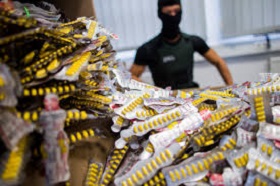Analytics, Custom, Estonia, Markets and Companies
International Internet Magazine. Baltic States news & analytics
Saturday, 07.02.2026, 05:39
Survey: Estonia losing tens of millions of euros due to counterfeit goods
 Print version
Print version |
|---|
Lost sales for the pharmaceuticals sector amount to 12 mln euros, lost sales for the cosmetics and personal care sector to 8 mln euros, lost sales for wines and spirits to 7 mln euros and lost sales for the toys and games sector to 2 mln euros a year, the EUIPO said on Wednesday.
Across the EU, these four sectors lose up to 19 bn euros in annual sales due to counterfeit goods. The amount in sales lost by cosmetics and personal care is estimated to be 9.6 bn euros, the amount lost by the pharmaceuticals sector 6 billion euros, the amount lost by wines and spirits 2.3 bn euros and the amount lost by toys and games one billion euros a year.
The economic and social damage caused by counterfeiting deprives governments of revenue and can support serious crime like drug trafficking and money laundering, according to the EUIPO.
The report estimates that in addition to up to 19 bn euros of sales lost by businesses every year, governments across the EU lose up to 15 bn euros per year in total due to the presence of counterfeit goods in the marketplace, through reduced direct and indirect taxes, as well as social contributions, which are not paid by illegal manufacturers.
Counterfeits do not undergo the same stringent testing as genuine goods to make sure they are safe for people to consume or use.
Analysis by the EUIPO shows that recorded dangerous counterfeit goods were assessed as posing a serious risk to consumers. Most of the goods in question were destined for children, and were either toys, childcare items or children's clothing.
"Counterfeiting is not a victimless crime. Fake products take sales away from legitimate businesses, and deprive governments of much-needed revenue. They carry clear health and safety risks for those who use them. But as our joint work with Europol shows, the proceeds from counterfeiting can also support serious organized crime. To fully tackle this, concerted international action is needed at all levels," the executive director of the EUIPO, Christian Archambeau, said.
Research carried out by the EUIPO and Europol also reveals the links between counterfeiting and other serious crimes. Since 2016, enforcers across the EU have carried out 29 major anti-counterfeiting and piracy operations, targeting organised gangs which were also involved in other serious crimes, including drug trafficking and money laundering.
Lost sales in the cosmetics and personal care sector in particular have increased by over 2.5 bn euros since the last such analysis was published by the EUIPO in 2019; the highest increase across the sectors studied. Approximately 14.1% of the cosmetic and personal care sector's sales, equaling 9.6 bn euros, is lost annually across the EU due to the presence of counterfeit products. In Estonia, that figure stands at 7.2%.
The EUIPO is a decentralized agency of the EU, based in Alicante, Spain. It manages the registration of the European Union trade mark (EUTM) and the Registered Community Design (RCD), both of which provide intellectual property protection in all EU member states. The EUIPO also carries out cooperation activities with the national and regional intellectual property offices of the EU.
- 28.01.2022 BONO aims at a billion!
- 30.12.2020 Накануне 25-летия Балтийский курс/The Baltic Course уходит с рынка деловых СМИ
- 30.12.2020 On the verge of its 25th anniversary, The Baltic Course leaves business media market
- 30.12.2020 EU to buy additional 100 mln doses of coronavirus vaccine
- 30.12.2020 ЕС закупит 100 млн. дополнительных доз вакцины Biontech и Pfizer
- 29.12.2020 В Латвии вводят комендантский час, ЧС продлена до 7 февраля
- 29.12.2020 Latvia to impose curfew, state of emergency to be extended until February 7
- 29.12.2020 Lithuanian president signs 2021 budget bill into law
- 29.12.2020 Number of new companies registered in Estonia up in 2020
- 28.12.2020 Tartu to support students' solar car project








 «The Baltic Course» Is Sold and Stays in Business!
«The Baltic Course» Is Sold and Stays in Business!

